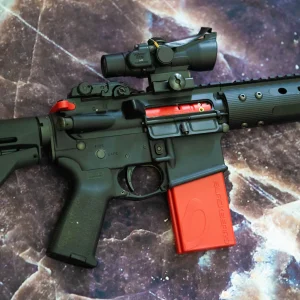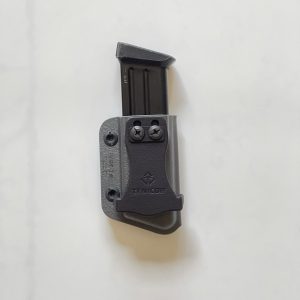The G24 Mount has been field tested by operators and fine-tuned from their hands on experience with our product. Pioneering the “break away” feature, this mount disconnects from the base under stress if desired reducing the potential for neck injury of the operator. The G24 mount is your “go to” for night vision goggles.
Features
Dovetail shoe interface securely locks NVG’s into place.
Breakaway feature reduces the risk of neck injury.
Ergonomical adjustments allow for one handed operation.
Maintains a very low-profile on the helmet.
Rail interface & extended models available.
Developed & battle proven by U.S. & NATO SOF.
Specifications
| Materials | Lightweight Aerospace Aluminum, Polymer |
| Height Adjust | 0.900in Total Vertical Travel |
| View to Stow | 130º Travel |
| Finite Tilt | 0-15º Tilt |
| Fore/Aft Travel | 1.400in Total Fore/Aft Travel (Now the same as G22E) |
| Auto On-Off | Applicable w/ Wilcox Metal Interface Shoes |
| Accommodates | AN/PVS-7A, AN/PVS-7C (Direct Mount) AN/PVS-7B*, AN/PVS-14*, AN/PVS-15*, AN/PVS-18*, AN/PVS-21*, L3Harris BNVD (AN/PVS-31A), BNVD1531 |
| Wilcox P/N | 28300G24-B (Black), |
Only 1 left in stock
$527.31 Original price was: $527.31.$500.24Current price is: $500.24.
International Traffic in Arms Regulations (ITAR) is a set of United States government regulations that control the export and import of defense-related articles and services on the United States Munitions List (USML). These regulations implement the provisions of the Arms Export Control Act (AECA), and are described in Title 22 (Foreign Relations), Chapter I (Department of State), Subchapter M of the Code of Federal Regulations. The Department of State Directorate of Defense Trade Controls (DDTC) interprets and enforces ITAR. Its goal is to safeguard U.S. national security and further U.S. foreign policy objectives. The related Export Administration Regulations (Code of Federal Regulations Title 15 chapter VII, subchapter C) are enforced and interpreted by the Bureau of Industry and Security in the Commerce Department. The Department of Defense is also involved in the review and approval process. Physical enforcement of import and export laws at border crossings is performed by Customs and Border Protection, an agency of the Department of Homeland Security.
For practical purposes, ITAR regulations dictate that information and material pertaining to defense and military related technologies (for items listed on the U.S. Munitions List) may only be shared with U.S. Persons unless authorization from the Department of State is received or a special exemption is used. U.S. Persons (including organizations) can face heavy fines if they have, without authorization or the use of an exemption, provided foreign (non-US) persons with access to ITAR-protected defense articles, services or technical data.
The U.S. Munitions List changes over time. Until 1996–1997, ITAR classified strong cryptography as arms and prohibited their export from the U.S. Another change occurred as a result of Space Systems/Loral’s conduct after the February 1996 failed launch of the Intelsat 708 satellite. The Department of State charged Space Systems/Loral with violating the Arms Export Control Act and the ITAR. As a result, technology pertaining to satellites and launch vehicles became more carefully protected.
ITAR does not apply to information related to general scientific, mathematical or engineering principles that is commonly taught in schools and colleges or information that is (legitimately) in the public domain. Nor does it apply to general marketing information or basic system descriptions. These exceptions must, however, be treated with extreme caution: college professors have been prosecuted for breaches of the AECA as a result of access to USML items by foreign graduate students and companies have been penalized for alleged breaches of the AECA for failing to properly remove USML items from material used to market defense articles. The U.S. Government has also taken action (albeit unsuccessfully) for the export of technical data that was (allegedly) already publicly available on the internet.
ITAR does apply to items identified under the Invention Secrecy Act.







